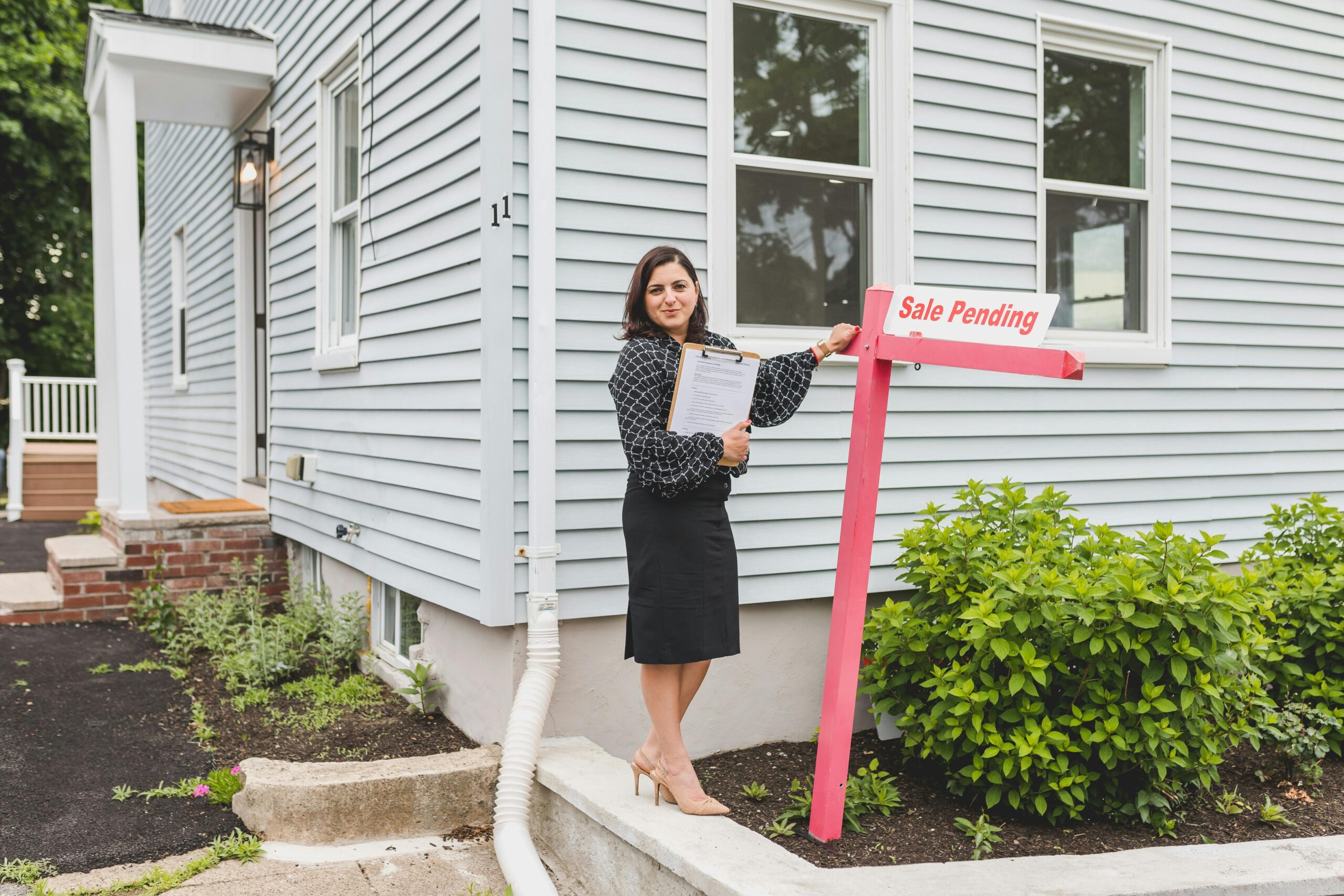
A 10 Step Seller's Guide
This guide is designed to personally assist you in getting acquainted with the home-selling process. Selling your home requires knowledge and experience beyond staging and marketing. It can be a stressful process, especially when you don’t know what to expect. I’m here to provide you with the knowledge and resources you need to make an informed decisions through the process. Every seller has one thing in common: the desire to get as much money as possible from their existing residence as quickly and as hassle-free as possible. By Following these steps, you will be better prepared to sell your home for the best price possible.
1) Decide To Sell

Am I sure I want to sell? Deciding whether to sell your home is a significant decision that involves various factors. Consider your emotional attachment to your current home and neighborhood. Selling a home often involves letting go of sentimental memories. Consider whether the timing is right for you personally to sell your home. Evaluate factors such as family circumstances, career stability, and other life events that may influence your decision.
Am I ready to sell? Getting a home ready to sell often involves significant time, effort, and expense. It requires a significant commitment, including marketing the property, coordinating showings, negotiating offers, and completing paperwork. Do your homework to familiarize yourself as much as you can with selling process. By having a clear understanding of the process, you can better decide if you are prepared to go through with it and ensure a smooth sale.
Buy or sell first? Deciding whether to sell your current home before buying a new one or vice versa depends on various factors and personal preferences. Assess your financial situation, including available funds for a down payment, closing costs, and carrying two mortgages if you buy before selling. The decision depends on your circumstances, financial readiness, risk tolerance, and personal preferences. Take the time to carefully evaluate your options and make an informed decision that aligns with your goals and priorities.
Is everyone on board? Having your family on board when selling a home can be immensely helpful and allows everyone to contribute their ideas, preferences, and concerns regarding the sale of your home. Selling a home involves various tasks and responsibilities, from preparing the property for sale to coordinating showings and negotiations. Involving your family allows you to share the workload and divide tasks according to each person’s strengths and availability. It creates a sense of unity, support, and shared responsibility, making the selling process more manageable and less stressful for everyone involved.
2) Hire a Real Estate Agent

Realtors have extensive knowledge and experience in the real estate market, including current market trends, pricing strategies, and negotiation techniques. Their expertise allows them to navigate the complexities of the selling process with confidence and professionalism. Hiring a realtor saves you time and effort by handling all aspects of the selling process on your behalf from marketing and showings to negotiations and closing, allowing you to focus on other priorities in your life.
Selling your home without a real estate agent can be a challenging and complex process that involves various hardships. Without access to the Multiple Listing Service (MLS), and professional marketing resources, you will struggle to reach a broad audience of potential buyers. Negotiating with buyers and their agents requires strong communication and negotiation skills and will put you at a disadvantage when aiming to get the highest possible price for your home.
When choosing a real estate agent, Pay attention to how promptly and effectively the realtor communicates with you during the initial consultation and throughout the selling process. Choose an agent who is accessible, responsive, and proactive in keeping you informed and updated. Choose someone you feel comfortable with and trust to represent your best interests throughout the process. Look for qualities such as honesty, integrity, and professionalism, and ensure that you have good chemistry and rapport with the agent.
By partnering with a trusted realtor, you can streamline the selling process, achieve your goals, and maximize the value of your home. Once you’ve chosen a realtor, make sure to get a written agreement or contract that outlines the terms and conditions of your working relationship. Review the agreement carefully and ask questions about any provisions or clauses you don’t understand.
3) Evaluate All The Numbers

Clarifying all the proceeds from a house sale is essential. It helps avoid surprises or discrepancies during the closing process. By reviewing all the numbers, you can ensure that all expenses and deductions are accounted for accurately. After meeting and signing the contract with the realtor, you can include the commission amount in your calculation and get a rough idea of what the home can sell for.
If you have outstanding debts or financial goals, such as paying off loans, credit cards, or funding educational expenses, clarifying the proceeds allows you to allocate funds strategically and prioritize debt repayment or financial goals based on your needs and priorities. By having a clear understanding of the proceeds from the house sale provides you with peace of mind and confidence in your financial decisions. It allows you to approach the selling process with clarity, certainty, and a sense of control over your financial future.
Keep in mind that selling a home also involves various expenses, including closing costs, title insurance, attorney fees, and potential home repairs or staging costs. Clarifying the proceeds helps you budget for these expenses and ensures that you have sufficient funds to cover them without dipping into your savings.
Knowing all the proceeds from a house sale empowers you to make informed decisions, plan for the future, and achieve your financial goals. It’s an essential step in the selling process that provides clarity, transparency, and peace of mind for all parties involved. Also, it gives a better clarity of what you can afford to buy, once you sell.
4) Set The Right Price

As the real estate market is constantly shifting, knowing what is going on in the overall and local real estate markets will help you understand how different conditions can affect the sale price of your home. As an overview, there are three significant market positions: A Balanced market (Supply and demand are roughly equal), A Buyer’s market: (Prices are stable or dropping as the supply exceeds demand), and a Seller’s market: (Prices increase rapidly due to high demand and limited supply).
Work with your realtor to perform a CMA (Comparative Market Analysis). It’s a valuation tool used to determine the market value of a property by comparing it to similar properties that have recently sold, are currently on the market, or were listed but didn’t sell. The agent will make the necessary adjustments to account for the differences. The realtor also takes into account current market conditions, trends, and factors that may affect property value
Setting the right price for your home is crucial for a successful and efficient selling process. It increases its attractiveness to potential buyers, who are actively searching within your price range. This leads to more inquiries, showings, and offers, increasing your chances of selling the property quickly. A well-priced home makes a positive first impression and drives the sale price up. Proper pricing results in a quicker sale and minimizes inconveniences, such as the energy spent preparing for showings, maintaining cleanliness, arranging childcare, and allowing you to maintain a balanced lifestyle.
Incorrectly pricing a home can lead to various inconveniences and challenges. Overpriced homes, stay on the market for an extended period without selling and may be perceived as undesirable or overpriced by potential buyers. This can create a perception of desperation in the seller, leading to lowball offers or unfavorable negotiating positions. Overpricing can also lead to appraisal challenges if the property fails to appraise for the contract price. This can result in delays or cancellations of the sale, as buyers may have a hard time securing financing or renegotiating the purchase price based on the appraised value.
5) Prepare Your Home

Preparing your home for sale is essential to maximize its appeal to potential buyers. Remove excess clutter, personal items, and family photos to create a clean and neutral canvas that allows potential buyers to envision themselves living in the space. Clutter and personal items can be distracting to potential buyers and detract from the features of your home. By decluttering and depersonalizing, you minimize distractions and allow buyers to focus on the architectural details, layout, and potential of the space.
Open curtains and blinds to let in natural light, which helps create a bright and inviting atmosphere. Make sure to change all the light bulbs throughout the home, Lighting plays a significant role in creating a positive atmosphere and mood in your home. Soft, diffused lighting in living areas and bedrooms can evoke a sense of relaxation and comfort, while brighter lighting in kitchens and bathrooms can convey a sense of cleanliness and functionality
Fix any visible issues or minor repairs such as leaky faucets, squeaky doors, cracked tiles, or chipped paint. Ensure your home’s major systems and appliances are in good working order. Consider servicing the HVAC systems, water heaters, and other mechanicals to ensure they are functioning properly. Addressing these issues helps enhance the overall appeal and value of your home. First impressions matter, so invest in improving your home’s curb appeal by landscaping, mowing the lawn, trimming bushes, planting flowers, and ensuring the exterior is clean and well-maintained.
A deep clean helps eliminate odors from your home, including cooking smells, pet odors, and musty odors. Fresh, clean-smelling air creates a more pleasant and inviting atmosphere that enhances the appeal of the property. By investing time and effort into cleaning your home thoroughly, you maximize its marketability and increase your chances of achieving a successful sale at the best possible price.
6) Market Your Home

Work with your real estate agent to create a customized marketing strategy tailored to your home. A real estate agent can leverage their expertise, network, and resources to market your home effectively and attract qualified buyers. Aside from sticking a for sale sign in your yard and putting up a listing on MLS (Multiple Listing Service), there are other avenues to attract potential buyers, generate interest, and ultimately achieve a successful sale.
Always use professional photography, virtual tours, or 3D walkthroughs to showcase your home. High-quality photos capture the attention of potential buyers and highlight your home’s features and amenities. 3D walkthroughs of your home to provide potential buyers with an immersive experience and allow buyers to explore your home online. Professional photography and virtual tours or 3D walkthroughs are essential for creating a positive first impression
Utilizing social media platforms such as Facebook, Instagram, and Twitter is a great way to showcase your home to a wider audience by creating engaging posts, and sharing photos and videos. it provides an unparalleled reach by exposing your home locally and globally. Friends, family, and followers can also help amplify your reach by sharing your listing with their networks. Social media platforms also offer advanced targeting options that allow you to reach specific demographics, interests, and behaviors relevant to your target audience.
Open houses are another great way to allow potential buyers to view your home in person. Open houses allow buyers to explore the property, ask questions, and envision living there. It creates a sense of urgency among potential buyers who may fear missing out on the opportunity to see the property firsthand. This can lead to increased competition and multiple offers, driving up the sale price. Open houses can also lead to on-the-spot offers or scheduled follow-up appointments for private showings.
7) Showings

Be Flexible!! Be flexible with scheduling and make your home available for showings. Accommodating requests promptly and being available to answer questions can help facilitate a positive experience for buyers. Buyers often make decisions quickly, especially in competitive markets. By being available for showings at short notice, you seize opportunities to showcase your home to motivated buyers who are ready to decide.
Always be prepared for a showing!! Leave all blinds open to let in natural light and have all the lights turned on. Eliminate odors from your home by daily cleaning, deodorizing, and airing out the space. Avoid strong scents or air fresheners that may be off-putting to potential buyers and opt for neutral or subtle fragrances instead. Try to be absent, buyers often feel more comfortable exploring a home freely and asking questions when the owner is not present, it allows buyers to focus on evaluating the property without interference.
Safety first!! Secure valuables, personal belongings, and sensitive information to protect your privacy and security. Lock away valuables, important documents, and personal items. By securing valuables, you prevent unauthorized access to sensitive information and personal items, reducing the risk of identity theft or property damage. Securing valuables also reduces the risk of items being lost or misplaced during showings. Securing valuables eliminates distractions and disruptions, allowing buyers to focus on evaluating the property without being tempted or distracted by valuable items.
Leave it to the professionals!! Keep a low profile and let your realtor do the talking. Always defer any price discussions (or other related matters) to your realtor. Realtors act as professional representatives for sellers, ensuring that all inquiries are addressed promptly and professionally. Having your realtor handle all questions optimizes the sale as he is a more skilled negotiator and someone who can handle objections effectively.
8) Reviewing Offers

Showtime!! Once you receive written offers from potential buyers, it’s time to start reviewing them with your realtor. Reviewing offers allows you to understand the terms and conditions proposed by potential buyers. This includes the purchase price, contingencies, timelines, and any additional terms outlined in the offer. If there are multiple offers on the table, reviewing them all helps evaluate each offer’s merits and helps us determine which one best aligns with your goals and preferences. This may involve considering the offer price, financing terms, and closing timeline. Make sure you address any ambiguities or uncertainties to ensure that you have a clear understanding of the terms presented.
After we have reviewed the offer or offers, we have the option to either counter the offer, accept it, or reject it. Discuss the pros and cons of each offer with your realtor before making a final decision. This may involve considering factors such as the buyer’s financial qualifications, the likelihood of closing, and any contingencies or special requests included in the offer. The expertise and guidance of your realtor can help navigate negotiations effectively.
Once you and the buyer agree with the terms and conditions of the offer, it’s time to accept the offer by signing all the documents accordingly. At this point, the offer becomes a legally binding contract and both parties are expected to fulfill their obligations outlined in the agreement. It’s important to note that an accepted offer does not always guarantee the completion of the sale. If the transaction is subject to various contingencies and conditions, either party may have the opportunity to back out of the contract if these conditions are not met.
Once we have an accepted offer, The Buyer needs to deliver a deposit. A deposit refers to a sum of money provided by the buyer to demonstrate their commitment to purchasing the property and is typically submitted along with the purchase offer or shortly after the offer is accepted (Typically within 24 hours). The deposit is typically held in your realtor’s brokerage office until the closing of the sale. Once the deposit is received and all conditions are satisfied, the offer becomes firm. In other words, the offer is now free from any clauses that would allow the buyer to back out of the transaction without penalty.
9) Prepare For Closing

Preparing for closing as a seller once your house is sold involves several important steps to ensure a smooth and successful transaction. Carefully review all closing documents provided by your real estate agent or attorney. This may include the settlement statement, deed, closing disclosure, and any other paperwork related to the sale. Gather all necessary documents and information required for closing, such as photo identification, keys, garage door openers, appliance manuals, warranties, and other items specified in the contract. Coordinate with your bank or mortgage broker to ensure they have all the required documents
If you agree to make repairs as part of the sale contract, ensure that all agreed-upon repairs have been completed satisfactorily and documented. Provide receipts or invoices as proof of completion. Contact utility companies to arrange for the transfer or cancellation of services effective on the closing date. This includes electricity, gas, water, sewer, trash, internet, and cable services. Start packing and book a moving truck early to ensure a smooth transition.
Be sure to not pack anything that you agreed to sell! Unless you specifically mentioned certain fixtures, everything must remain in place. You are responsible for handing over the home in the same condition as it was at the time of closing. This applies to everything that was in the agreement. If the home suffers a major disaster, you are responsible for telling the buyer, at which point the buyer may walk away from the deal and have the deposit returned.
The time frame between a firm offer and the buyer taking possession of the property may vary depending on the situation. In Ontario the time frame is typically 60 days; however, it’s always best to start preparing earlier than later. Being well-prepared allows you to anticipate potential challenges and address them proactively, reducing last-minute scrambling and stress. Surprises always come up and it’s better to prepare well in advance to have the flexibility to adapt and handle unexpected challenges.
10) Close

The closing process in a real estate transaction is the final step where you are legally transferring ownership to the new buyer. On closing day, you will attend the appointment at the designated time and location, typically at your attorney’s office. Once there, you will sign all closing documents presented to you. Carefully read each document and ask questions if you need clarification on any terms or provisions.
Be sure to Maintain open and clear communication with all parties involved in the transaction, including the real estate agent, lenders, and attorneys. Promptly respond to any inquiries or requests for information to avoid delays or misunderstandings. This is an important and sensitive day for you and the buyer, good communication with all parties involved is the key to ensuring that things will go smoothly.
Once all the paperwork is signed, It’s time to hand over the keys, garage door openers, and any other items specified in the contract, to the buyer. Vacate the property and arrange for a smooth transition of possession to the new owner. After the closing, follow up with your real estate agent, attorney, and lender to ensure that all necessary post-closing tasks are completed, such as updating records, canceling insurance policies, and confirming the release of any liens or encumbrances on the property
Also on the closing day, the closing agent (typically your attorney) will disburse funds to pay off any existing liens or mortgages on the property, and any outstanding closing costs and fees. The remaining funds are distributed to the seller as proceeds from the sale. The time frame to receive your remaining funds varies but typically you should receive it the same day or the day after.
